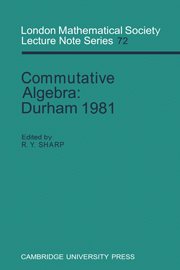Book contents
- Frontmatter
- Contents
- Preface
- Addresses of Contributors
- List of Participants
- PART I THE LOCAL HOMOLOGICAL CONJECTURES, BIG COHEN-MACAULAY MODULES, AND RELATED TOPICS
- The syzygy problem: a new proof and historical perspective
- The theory of homological dimensions of complexes
- Complexes of injective modules
- The local homological conjectures
- The rank of a module
- Modules of generalized fractions and balanced big Cohen-Macaulay modules
- Sur la théorie des complexes parfaits
- PART II DETERMINANTAL IDEALS, FINITE FREE RESOLUTIONS, AND RELATED TOPICS
- PART III MULTIPLICITY THEORY, HILBERT AND POINCARÉ SERIES, ASSOCIATED GRADED RINGS, AND RELATED TOPICS
- FURTHER PROBLEMS
The local homological conjectures
Published online by Cambridge University Press: 05 May 2013
- Frontmatter
- Contents
- Preface
- Addresses of Contributors
- List of Participants
- PART I THE LOCAL HOMOLOGICAL CONJECTURES, BIG COHEN-MACAULAY MODULES, AND RELATED TOPICS
- The syzygy problem: a new proof and historical perspective
- The theory of homological dimensions of complexes
- Complexes of injective modules
- The local homological conjectures
- The rank of a module
- Modules of generalized fractions and balanced big Cohen-Macaulay modules
- Sur la théorie des complexes parfaits
- PART II DETERMINANTAL IDEALS, FINITE FREE RESOLUTIONS, AND RELATED TOPICS
- PART III MULTIPLICITY THEORY, HILBERT AND POINCARÉ SERIES, ASSOCIATED GRADED RINGS, AND RELATED TOPICS
- FURTHER PROBLEMS
Summary
AcknowledgmeAnts
The author wishes to thank once more the organizers of the Durham Symposium, Professor D.G.Northcott and Dr. R. Y. Sharp, for putting together an excellent conference.
Notes taken by Dr.Sharp were a great aid to the author in preparing this article.
The author was supported in part by a grant from the National Science Foundation, U.S.A.
1. Rigidity, multiplicities, and other conjectures
What follows is a modified version of a series of three lectures presented during the Durham Symposium on Commutative Algebra, which was held during the period July 15–25, 1981. Some proofs given during those lectures but which are to appear elsewhere have been omitted, while others which were sketched or not given in the original lectures have been provided in greater detail here.
I would like first to recall two conjectures which I feel have played a pivotal role in the development of local homological commutative algebra, and which have inspired much work and many results in several directions, not all of which are “homological”.
In the sequel all rings are commutative, associative, with identity, all modules are unital, and “local ring” means Noetherian ring R with a unique maximal ideal m.
The first is as follows.
RIGIDITY CONJECTURE. Let R be a local ring, let M, N be finitely generated R–modules, and suppose that pdRM is finite. Suppose that TorRi(M, N) = O. Then TorRj(M, N) = O for all j ≥ i.
- Type
- Chapter
- Information
- Commutative AlgebraDurham 1981, pp. 32 - 54Publisher: Cambridge University PressPrint publication year: 1983

